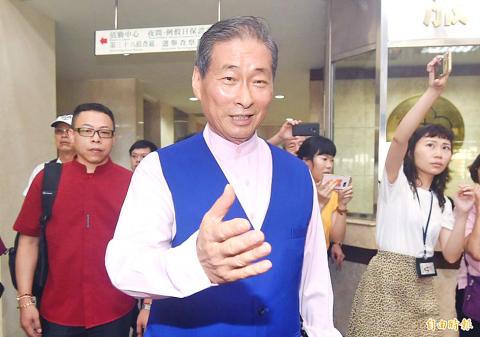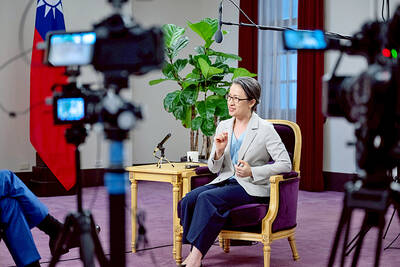The Taipei District Prosecutors’ Office yesterday dropped charges against Chinese Unity Promotion Party (CUPP) Chairman Chang An-le (張安樂) and another CUPP member in connection with a Taipei rally on Oct. 1 last year, but indicted another CUPP executive on suspicion of buying votes.
The decision to stop the prosecution of Chang, a former Bamboo Union boss known by his gang nickname of “White Wolf,” quickly drew criticism.
Chang and Hu Ta-kang (胡大剛) were charged in connection with an event in front of the Taipei Railway Station to celebrate China’s National Day.

Photo: Chiu Yi-chin, Taipei Times
Chang has said that the event was not political, but was to perform traditional Chinese cultural rites and was not related to China’s National Day.
The event attracted a large police presence, and Chang and several hundred CUPP members ignored police calls to disperse.
Several people filed judicial complaints alleging that Chang and other CUPP members were pledging allegiance to China, contrary to obligations of Republic of China (ROC) citizens, and possibly contraventing of national security laws.
Taipei prosecutors indicted Chang and Hu for breaches of the National Security Act (國家安全法) and Assembly and Parade Act (集會遊行法), as the event had not been approved by the Taipei City Government and the CUPP members ignored police orders to disperse.
However, prosecutors yesterday said that they dropped the charges due to a lack of evidence of criminal offenses.
The decision to drop the charges against Chang An-le drew criticism on the Internet, with critics saying there was clear evidence of him leading CUPP members in celebrating China’s National Day.
However, the office indicted former CUPP legislator-at-large nominee Ho Jianghua (何建華) on vote-buying charges in connection to activities in December last year.
Ho is also chairwoman of the Taipei-based Chinese Women’s Federation, a pro-China organization whose members are mostly Chinese women married to Taiwanese and settled in Taiwan.
She was born in Hunan Province and obtained permission to live and work in Taiwan, and eventual ROC citizenship, after marrying a Taiwanese man in 1996.
Prosecutors allege Ho contravened election laws by organizing a five-day trip from Kinmen Island (金門) to Xiamen, China, through the “small three links,” with 16 people paying NT$7,800 per person for the trip.
Investigators allege the tour was subsidized by the Chinese government, as the NT$7,800 only covered the transportation, insurance and administration fees, not accommodation, meals or other expenses.
Participants allegedly told investigators that Ho had told them to vote for the CUPP in the Jan. 11 legislative elections.

China might accelerate its strategic actions toward Taiwan, the South China Sea and across the first island chain, after the US officially entered a military conflict with Iran, as Beijing would perceive Washington as incapable of fighting a two-front war, a military expert said yesterday. The US’ ongoing conflict with Iran is not merely an act of retaliation or a “delaying tactic,” but a strategic military campaign aimed at dismantling Tehran’s nuclear capabilities and reshaping the regional order in the Middle East, said National Defense University distinguished adjunct lecturer Holmes Liao (廖宏祥), former McDonnell Douglas Aerospace representative in Taiwan. If

TO BE APPEALED: The environment ministry said coal reduction goals had to be reached within two months, which was against the principle of legitimate expectation The Taipei High Administrative Court on Thursday ruled in favor of the Taichung Environmental Protection Bureau in its administrative litigation against the Ministry of Environment for the rescission of a NT$18 million fine (US$609,570) imposed by the bureau on the Taichung Power Plant in 2019 for alleged excess coal power generation. The bureau in November 2019 revised what it said was a “slip of the pen” in the text of the operating permit granted to the plant — which is run by Taiwan Power Co (Taipower) — in October 2017. The permit originally read: “reduce coal use by 40 percent from Jan.

‘SPEY’ REACTION: Beijing said its Eastern Theater Command ‘organized troops to monitor and guard the entire process’ of a Taiwan Strait transit China sent 74 warplanes toward Taiwan between late Thursday and early yesterday, 61 of which crossed the median line in the Taiwan Strait. It was not clear why so many planes were scrambled, said the Ministry of National Defense, which tabulated the flights. The aircraft were sent in two separate tranches, the ministry said. The Ministry of Foreign Affairs on Thursday “confirmed and welcomed” a transit by the British Royal Navy’s HMS Spey, a River-class offshore patrol vessel, through the Taiwan Strait a day earlier. The ship’s transit “once again [reaffirmed the Strait’s] status as international waters,” the foreign ministry said. “Such transits by

Taiwan is doing everything it can to prevent a military conflict with China, including building up asymmetric defense capabilities and fortifying public resilience, Vice President Hsiao Bi-khim (蕭美琴) said in a recent interview. “Everything we are doing is to prevent a conflict from happening, whether it is 2027 or before that or beyond that,” Hsiao told American podcaster Shawn Ryan of the Shawn Ryan Show. She was referring to a timeline cited by several US military and intelligence officials, who said Chinese President Xi Jinping (習近平) had instructed the Chinese People’s Liberation Army to be ready to take military action against Taiwan